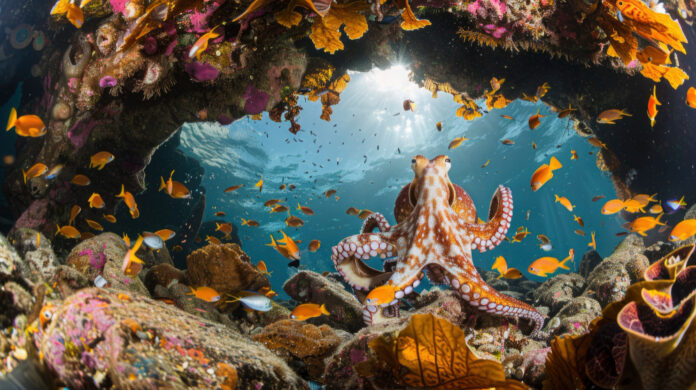The Kingdom’s Red Sea projects promote sustainable tourism in Saudi Arabia while protecting vital marine ecosystems and endangered species
Saudi Arabia’s tourism development strategy is making waves on the global stage, particularly through its focus on the Red Sea. At the heart of this push is a balance between attracting tourists to its pristine waters and protecting the delicate marine ecosystems that underpin the region’s natural beauty. This balance is seen as critical to preserving the country’s long-term environmental and economic future.
With the backdrop of Saudi Vision 2030, a national agenda designed to diversify the economy away from oil, the Kingdom is investing heavily in the tourism sector. But unlike many traditional development projects, Saudi Arabia is actively incorporating environmental stewardship into its plans. The Red Sea, one of the world’s most biodiverse marine environments, is the centrepiece of this effort. Home to over 1,000 species of fish and approximately 265 types of coral, this region is a jewel in the Kingdom’s ecological crown.
However, it’s not just the species richness that has attracted international attention; it’s also the unique resilience of the Red Sea’s coral reefs. Unlike many others around the world, these reefs display a natural resistance to higher temperatures, offering hope in the face of global coral bleaching events. Marine scientists are studying this phenomenon closely to better understand how these reefs thrive in such conditions and how their resilience could inform coral restoration efforts globally.
Embed from Getty ImagesAt the forefront of Saudi Arabia’s marine conservation efforts is Red Sea Global (RSG), the entity leading the charge on eco-friendly tourism developments. Projects like AMAALA and The Red Sea aim to redefine luxury tourism, with sustainability and environmental preservation as core pillars. AMAALA, designed as an ultra-luxury wellness destination, and The Red Sea, an archipelago of pristine islands, are central to this strategy. They aim to attract eco-conscious travellers, offering a unique blend of luxury experiences and environmental responsibility.
Raed Al-Basseet, Group Chief Environment and Sustainability Officer at RSG outlined the group’s commitment to protecting these invaluable ecosystems. “The coastal ecosystems of the Red Sea, including coral reefs, seagrasses, and mangroves, offer immense value, not just ecologically but also economically and socially,” Al-Basseet said. “They support local fisheries, tourism, and coastal protection, all while providing food security and employment for the surrounding communities.”
RSG has implemented an impressive array of initiatives aimed at ensuring long-term environmental sustainability. One of the flagship programmes involves the breeding and relocation of coral fragments, designed to bolster coral populations in areas facing environmental pressures. This effort is supported by RSG’s coral breeding lab, which nurtures juvenile coral for future restoration projects. The company also conducted a large-scale environmental survey last year, covering 250 kilometres of coastline, one of the most comprehensive assessments ever undertaken by a developer. The findings from this survey have played a crucial role in shaping RSG’s conservation strategy.
One of the key discoveries from the survey was the identification of important breeding sites for endangered species, including hawksbill and green turtles. This revelation has underscored the global significance of the Red Sea’s ecosystems, not only for marine biodiversity but also for protecting endangered species. RSG’s conservation efforts extend to creating protected zones on several islands, with 75 per cent of AMAALA’s coastline designated as conservation areas. Cutting-edge technologies such as satellite monitoring, drones, and autonomous underwater vehicles are being used to monitor and safeguard these ecosystems, ensuring that human activity remains in harmony with nature.
Beyond coral and turtle conservation, RSG is actively involved in other key projects, including large-scale mangrove restoration. In 2023, the company produced over 1 million mangrove seedlings, with plans to plant a further 3 million this year. These initiatives are not just about restoring mangrove forests; they also contribute significantly to carbon sequestration, supporting Saudi Arabia’s broader climate goals.
The Kingdom’s tourism and conservation strategy is not just about environmental responsibility. It’s also about ensuring that future generations can continue to benefit from the natural beauty and biodiversity of the Red Sea. This is critical for the region’s growing ecotourism industry, which draws visitors from around the world to experience its unique marine habitats, from coral reefs to seagrass meadows.
Looking ahead, RSG is targeting a 30 per cent net conservation benefit by 2040. As part of this ambitious plan, the company has already installed over 760,000 solar panels across five solar farms, reducing carbon emissions by over 46,000 tonnes. These efforts are being driven by a desire to achieve sustainable tourism that doesn’t compromise on luxury or environmental protection.
Al-Basseet summarised RSG’s mission succinctly: “Our goal is to create a harmonious balance between luxury tourism and environmental stewardship. By protecting these ecosystems, we are preserving the very assets that attract tourists, ensuring that future generations can continue to enjoy and benefit from these natural wonders.”
Saudi Arabia’s tourism and conservation projects in the Red Sea demonstrate a bold vision for the future — one where economic development and environmental preservation go hand in hand. As global interest in sustainable tourism continues to grow, the Kingdom is setting a standard that others may soon follow.
